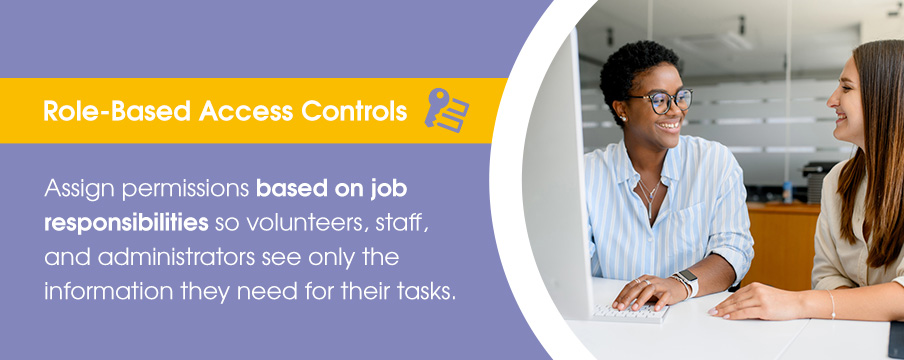Volunteer data is the backbone of any successful program, but with increased digitalization comes greater responsibility. As organizations collect, store, and manage sensitive volunteer information, the risks of data breaches and compliance failures grow. Understanding the essentials of volunteer data security is crucial for protecting your volunteers, maintaining trust, and safeguarding your organization’s long-term success.
Why Volunteer Data Security Matters
Volunteer information protection is a fundamental part of your organization’s reputation and operational integrity. Failing to protect sensitive information can have far-reaching consequences.
Two important factors place nonprofits in cybercriminals’ crosshairs. United States nonprofits raised close to $6 billion in 2024 while being perceived as poorly guarded and ill-prepared to safeguard their organizations due to limited budgets and technological expertise. In fact, 78% of charitable organizations believe they lack the cyber resilience to fully protect themselves from attack.
Nonprofits are particularly vulnerable in these areas:
- Personal data: Data breaches can expose personal information like addresses, phone numbers, and background checks, leading to identity theft or fraud.
- Donor trust: Volunteers expect their data to be handled with care. A breach can erode donor relationships and community support, making recruitment and retention more difficult. Organizations are required to notify affected individuals and authorities, further damaging their reputation.
- Legal trouble: Noncompliance with federal and state-specific data privacy laws can result in hefty fines and legal action.
Key Data Security Threats Facing Volunteer Programs
Understanding the most common threats to securing volunteer information is the first step in building a robust defense. Nonprofits face a unique set of cybersecurity challenges that require proactive management.
Common threats include:
- Phishing and social engineering: Attackers use deceptive emails or messages to trick staff or volunteers into revealing login credentials or sensitive data.
- Ransomware and malware: Malicious software can lock your data or systems until a ransom is paid, disrupting operations and risking data loss.
- Unauthorized access: Weak passwords or a lack of access controls can allow unauthorized individuals to view or alter volunteer data.
- Insider threats: Mistakes or malicious actions by staff or volunteers can lead to accidental or intentional data leaks.
Essential Data Security Practices for Volunteer Management
Implementing secure volunteer information management best practices is vital for protecting your organization and volunteers. These foundational steps can significantly reduce your risk profile.
1. Encryption and Secure Data Storage
Encrypt sensitive data to prevent unauthorized access. This way, data is unreadable and unusable to attackers if accessed or intercepted.
Use secure, cloud-based volunteer management systems with built-in security features. Choose platforms that offer transport layer security (TLS) encryption, secure data centers, and compliance with industry standards like SOC 2 or ISO 27001. In addition, a solution should provide automatic backups and disaster recovery to protect against data loss.
Regularly audit your data storage practices. Review where and how data is stored, and ensure sensitive information is not kept in unsecured locations like spreadsheets, email attachments, or personal devices.
2. Role-Based Access Controls

Limit data access to only those who need it for their role. Assign permissions based on job responsibilities so volunteers, staff, and administrators see only the information they need for their tasks.
Regularly review and update permissions as staff and volunteer roles change, and remove access immediately when someone leaves the organization or changes roles to safeguard volunteer data privacy.
Implement multi-factor authentication (MFA) for all users with access to sensitive data. MFA adds an extra layer of security, making it harder for unauthorized users to gain entry even if passwords are compromised.
3. Regular Software Updates and Patching
Keep all systems and applications up to date to protect against known vulnerabilities. Outdated software is a common entry point for cyberattacks. It is vital that your volunteer management platform and all related tools are current.
Enable automatic updates for operating systems, applications, and security tools to reduce the risk of human error or oversight.
Monitor for security advisories and apply critical patches immediately. Staying informed about vulnerabilities affecting your software stack and acting quickly to address them can prevent data breaches from happening in the first place.
4. Data Minimization
Collect only the data you need, avoid storing sensitive data unless absolutely necessary, and securely dispose of outdated or unnecessary information. Essentialfields include:
- Contact information
- Emergency contacts
- Relevant qualifications
Create a volunteer database security policy that includes how long you will keep volunteer data and set up regular reviews to delete or anonymize records that are no longer needed. When disposing of digital records, use secure deletion tools so data cannot be recovered. For physical records, use shredding or certified destruction services.
Compliance and Legal Considerations
As regulations change, organizations must keep pace to avoid penalties and protect their communities. Common areas of compliance include:
- GDPR, CCPA, and other regulations: TheGeneral Data Protection Regulation (GDPR) applies to any organization handling data of EU citizens. It requires explicit consent, data access, and deletion rights. The California Consumer Privacy Act (CCPA) and similar laws in the U.S. require transparency and allow individuals to opt out of data collection.
- Consent management: Get clear, documented consent from volunteers for data collection and processing. Provide volunteers with easy ways to access, correct, or delete their data.
- Data breach notification: Have a plan to notify affected individuals and authorities in the event of a breach.
Building a Culture of Data Security
Your people are your first line of defense. Creating a culture of security awareness is essential for long-term volunteer information protection.
Include data security in new volunteer and staff onboarding and follow up with regular, role-appropriate training on data security best practices and recognizing threats.
Develop and communicate clear policies for data handling and incident reporting. Encourage staff to report suspected breaches or vulnerabilities by recognizing and rewarding proactive security behavior. Your policies should be easily accessible and reviewed and updated regularly to keep up with volunteer data security best practices.
How Volgistics Protects Your Volunteer Data
Choosing the right volunteer management software is a critical step in your data security journey. Volgistics is designed to protect volunteer information in the following ways:
- Advanced security features: End-to-end encryption for data in transit and at rest and regular security audits and compliance checks.
- Role-based access and permissions: Customizable access levels ensure only authorized users can view or edit sensitive information.
- Automated compliance tools: Built-in features help manage consent, data access requests and secure data deletion.
- Reliable cloud infrastructure: Secure cloud hosting with regular backups and disaster recovery protocols.
- Dedicated support: Expert support to help you implement best practices and respond to security concerns.

Don’t leave the security of your volunteer data to chance. Taking action now can prevent costly mistakes and build a foundation of trust with your volunteers. Volgistics is a group of dedicated volunteer management and IT professionals with the tools and support you need to keep your program secure and compliant.
Connect with us today by filling out our contact form or requesting a free 30-day trial. Take the next crucial step toward empowering your team with industry-leading security and peace of mind.

